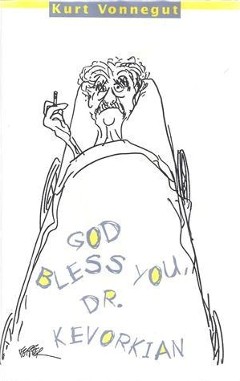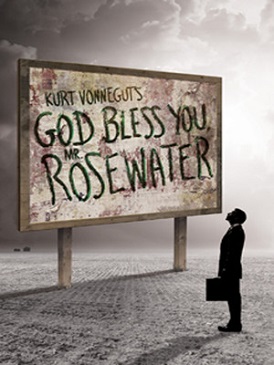
Kurt Vonnegut was an American author known for his satirical and darkly humorous novels. His published work includes fourteen novels, three short-story collections, five plays, and five nonfiction works over fifty-plus years; further works have been published since his death.

Slaughterhouse-Five, or, The Children's Crusade: A Duty-Dance with Death is a 1969 semi-autobiographic science fiction-infused anti-war novel by Kurt Vonnegut. It follows the life experiences of Billy Pilgrim, from his early years, to his time as an American soldier and chaplain's assistant during World War II, to the post-war years. Throughout the novel, Billy frequently travels back and forth through time. The protagonist deals with a temporal crisis as a result of his post-war psychological trauma. The text centers on Billy's capture by the German Army and his survival of the Allied firebombing of Dresden as a prisoner of war, an experience that Vonnegut endured as an American serviceman. The work has been called an example of "unmatched moral clarity" and "one of the most enduring anti-war novels of all time". It has recently been banned from school libraries in the state of Florida.

Breakfast of Champions, or Goodbye Blue Monday is a 1973 novel by the American author Kurt Vonnegut. His seventh novel, it is set predominantly in the fictional town of Midland City, Ohio, and focuses on two characters: Dwayne Hoover, a Midland resident, Pontiac dealer and affluent figure in the city, and Kilgore Trout, a widely published but mostly unknown science fiction author. Breakfast of Champions deals with themes of free will, suicide, and race relations, among others. The novel is full of drawings by the author, substituting descriptive language with depictions requiring no translation.

The Sirens of Titan is a comic science fiction novel by Kurt Vonnegut Jr., first published in 1959. His second novel, it involves issues of free will, omniscience, and the overall purpose of human history, with much of the story revolving around a Martian invasion of Earth.

Timequake is a 1997 semi-autobiographical work by Kurt Vonnegut, Jr. Marketed as a novel, the book was described as a "stew" by Vonnegut, in which he summarizes a novel he had been struggling with for a number of years.
Tralfamadore is the name of several fictional planets in the novels of Kurt Vonnegut.

God Bless You, Dr. Kevorkian, by Kurt Vonnegut, is a collection of short fictional interviews written by Vonnegut and first broadcast on WNYC. The title parodies that of Vonnegut's 1965 novel God Bless You, Mr. Rosewater. It was published in book form in 1999.
Kilgore Trout is a fictional character created by author Kurt Vonnegut (1922–2007). Trout is a notably unsuccessful author of paperback science fiction novels.

Jailbird is a novel by American author Kurt Vonnegut, published in 1979 by Delacorte Press. The novel is often described as Vonnegut's "Watergate novel," as it explores themes related to the Watergate scandal, the American labor movement, and the political landscape of the United States during the mid-20th century.

Galápagos (1985) is the eleventh novel published by American author Kurt Vonnegut. Set in the Galápagos Islands after a global financial disaster, the novel questions the merit of the human brain from an evolutionary perspective. The title is both a reference to the islands on which part of the story plays out, and a tribute to Charles Darwin, on whose theory Vonnegut relies to reach his own conclusions. It was published by Delacorte Press.
Ilium is a fictional town in eastern New York state, used as a setting for many of Kurt Vonnegut's novels and stories, including Player Piano, Cat's Cradle, Slaughterhouse-Five, and the stories "Deer in the Works", "Poor Little Rich Town", and "Ed Luby's Key Club". The town is dominated by its major industry leader, the Ilium Works, which produces scientific marvels to assist, or possibly harm, human life. The Ilium Works is Vonnegut's symbol for the "impersonal corporate giant" with the power to alter humankind's destiny. The town has been compared to Zenith, the fictional setting in Sinclair Lewis's 1922 novel Babbitt.
Eliot Rosewater is a recurring character in the novels of American author Kurt Vonnegut. He appears throughout various novels as an alcoholic, and a philanthropist who claims to be a volunteer fireman. He runs the Rosewater Foundation, an organization created to keep the family's money in the family. He is among the few fans of the novels of Kilgore Trout.

Venus on the Half-Shell is a science fiction novel by American writer Philip José Farmer, writing pseudonymously as "Kilgore Trout", a fictional recurring character in many of the novels of Kurt Vonnegut. This book first appeared as a fictitious "excerpt"—attributed to Trout —in the ninth chapter of Vonnegut's God Bless You, Mr. Rosewater (1965). With Vonnegut's permission, Farmer expanded the fragment into an entire standalone novel. Farmer's story was first published in two parts beginning in the December 1974 issue of The Magazine of Fantasy and Science Fiction. The plot, in which Earth is destroyed by cosmic bureaucrats doing routine maintenance and the sole human survivor goes on a quest to find the "Definitive Answer to the Ultimate Question", was an inspiration for the plot of the later Hitchhiker's Guide to the Galaxy series.
The RAMJAC Corporation is a fictional multinational conglomerate, or megacorp, featured in several novels by Kurt Vonnegut. In Vonnegut's 1979 novel, Jailbird, the company, at its height, owns 19 percent of the United States, twice as large as the next largest conglomerate in the "Free World". Copyrights on Vonnegut's later books are also held by RAMJAC, much like Isaac Asimov's later copyrights are held by Nightfall, Inc..

Slaughterhouse-Five is a 1972 American comedy-drama military science fiction film directed by George Roy Hill and produced by Paul Monash, from a screenplay by Stephen Geller, based on the 1969 novel of the same name by Kurt Vonnegut. The film stars Michael Sacks as Billy Pilgrim, who is "unstuck in time" and has no control over where he is going next. It also stars Ron Leibman as Paul Lazzaro and Valerie Perrine as Montana Wildhack.

Palm Sunday is a 1981 collection of short stories, speeches, essays, letters, and other previously unpublished works by Kurt Vonnegut. The collection provides insight into Vonnegut's thoughts on various subjects, including writing, war, and his own literary career. The book is known for its eclectic mix of genres and personal reflections.

Breakfast of Champions is a 1999 American satirical black comedy film adapted and directed by Alan Rudolph, from Kurt Vonnegut, Jr.'s 1973 novel. Though the producers entered it into the 49th Berlin International Film Festival, the film was negatively received by critics and was a box office bomb that was withdrawn from theatres before going into wide release. While it has been released on VHS and DVD, it has not yet been given a digital release.
"Welcome to the Monkey House" is a Kurt Vonnegut short story that is part of the collection of the same name. It is alluded to in God Bless You, Mr. Rosewater as one of Kilgore Trout's stories.

A Barcalounger is a type of recliner that originated from Buffalo, New York, and is named after the company which manufactured it. Like other recliners, Barcaloungers have moving parts to change things such as the inclination of the back. Since the 2010 bankruptcy and 2011 re-emergence, they have been made in China.

Kurt Vonnegut's God Bless You, Mr. Rosewater is a 1979 musical that marked the first collaboration of composer Alan Menken and writer Howard Ashman. Based on Kurt Vonnegut's 1965 novel of the same name, the musical tells the story of Eliot Rosewater, a millionaire who develops a social conscience and creates a foundation to improve the lives of the citizens of an impoverished Indiana town.














